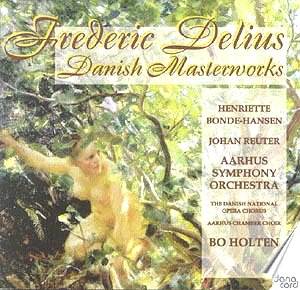Frederick DELIUS
(1862-1934)
Danish Masterworks:
An Arabesque for Baritone, chorus and orchestra;
Five Danish Songs; Seven Danish Songs; Two Danish Songs;
Intermezzo from Fennimore and Gerda;
Life's Dance
 Henriette Bonde-Hansen (soprano);
Johan Reuter (baritone)
Henriette Bonde-Hansen (soprano);
Johan Reuter (baritone)
The Danish National Opera Chorus and Aarhus Chamber Choir
Aarhus Symphony Orchestra conducted by Bo
Holten.
 DANACORD DACOCD 536
[70:27]
DANACORD DACOCD 536
[70:27]
Danacord

Here is an enterprising programme, beautifully and lovingly performed, that
will be treasured by all Delius lovers.
An Arabesque has oaken-toned Johan Reuter melancholy and anguished.
The work opens darkly "Hast thou in gloomy forests wondered?" But the gloom
soon lifts and light penetrates the trees. Twitterings, flutterings and dartings
of the forest's denizens are apparent although the singer still rues that
"Only the Pan of Love have I endured." Yet "Under the beams of the burning
sun" the chorus enthuses about the beauty of nature and Delius's orchestration
glitters but it is only "For a fleeting moment". For the singer is inconsolable
as he recalls "…Sighing was in her laughter, gladness was in her pain."
Then, as the music slows and darkens, and the chorus emulates a chill breeze;
there is a foreboding of death, "From the poisonous lilies' dazzling chalice,
Drank she to me." Winter and chill grip, "…winds…scatter leaves,
One after another, One after another… blood-reddened berries In the
white, cold snow..." And the chorus seals the tragedy with their final frosty,
deadening "Knowest thou Pan?". Here is Delius grasping every opportunity
to delicately tone paint -- and those aching, arching melodies! Here, too,
he pursues the theme that informs so much of his work - the transience of
life and love.
This feeling of lost love or love's passion recalled in regret or remorse,
or simply in rueful nostalgia, is the basis of many of the Danish songs on
this disc.
Taking the Five Danish Songs first sung by Henriette Bonde-Hansen.
The Page Sat in the Lofty Tower (words by Jens Peter Jacobsen)
beguilingly delivered, begins gently as the lovelorn Page tries in vain to
articulate his feelings then releases his pent up emotions with a loud blast
on his horn that echoes "Away across the mountains." In In Bliss we
walked with laughter (original words by Holger Drachmann) , the
joys and rigours of romance are remembered in peaceful old age. Two Brown
Eyes (Hans Christian Andersen) wraps beauty in innocence, and I hear
in the Night (Drachmann) gives Delius the opportunity to evoke nocturnal
shadows and ghostly movements that frighten and disorientate the singer who
we guess, is already emotionally perturbed. Autumn (Ludvig Holstein's
words) is another glorious evocation of the flight of the swan and a deeper
psychological questioning, "Father, whither fly the swans?…Away! Away!
No-one knows whereto!"
Silken Shoes (words by Jacobsen) in happier, more optimistic
mood open's the Seven Danish Songs again sung most
expressively by Bonde-Hanson. Irmelin Rose (Jacobsen), with one of
Delius's haunting bitter-sweet melodies, is about Princess Irmelin, the king's
daughter "… loveliest of all…" But there is a sting in the tail
for "Cold her heart was, cold as steel" and Delius seems to seal her doom
(of loneliness?) in his final dour drum stroke. Summer Nights
(Drachmann) is a ravishingly beautiful nocturne in its indigo stillness,
with gently droning horns adding wide perspectives. In the Seraglio
Gardens (Jacobsen) allows Delius to paint more exotically for this Arabian
picture - "…roses droop their heads, The pine trees are swaying so
silently…" Wine Roses (Jacobsen) begins and ends brusquely the
singer seeking oblivion in "wine roses, wine roses" yet memories
intrude… Through Long, Long Years (Jacobsen) finds the singer
in rueful mood again -- "Through long, long years we must atone…For
sorrows grow and hot tears flow." Finally we leave the singer longing for
lightness of heart in Let Springtime Come (Jacobsen).
The Intermezzo from Fennimore and Gerda is a gentle pastoral
interlude between the tragedy of the Fennimore story and the happier sequel
that is Gerda in the last of Delius's operas. Delius's 'Florida compositions'
are subtly recollected prompting this reviewer to wonder how much that rumour
of a possible romance and a possible love child in Florida, might have influenced
this and so many other of Delius's works?
Back to the songs, with the Two Danish Songs sung by Reuter.
The Violet (Holstein) is a tender serenade to a violet (or a sweetheart),
"Sweet flower mine! My little bird!…I would never trouble you…"
Sakuntala (Drachmann) is a considerable work and a gem. Set beneath
the Himalayas there is more passion and more of the exotic here than elsewhere
The concert is concluded as the orchestra plays Life's Dance.
This is a more dramatic Delius, the Delius of Paris. There is that
same hedonistic atmosphere we encountered in Paris with its wildness
and its abandoned waltzing. Again a large orchestra is employed, and once
more the work is strongly influenced by Richard Strauss. Delius prefaced
the manuscript of the work thus: "The dance of life! There will be two
people dancing in flowing clothes on a clear night through an avenue of black
cypresses and red rose bushes. The earth's glorious blood will gleam and
blaze in the roses, Clare. He holds her tightly against himself. He is deeply
serious and happy. There will be something festal about it. He will hold
her to himself so firmly that she is half sunk into him. She will be frightened
- frightened - and yet something will awaken inside her. Strength is streaming
into her from him. And before them is the abyss." Yes, indeed and Holten
delivers a bliastering performance that expresses life's turmoils, cruelties
and suffering as well as its joys and ecstasies. And the orchestra closes
with a sigh as though weeping for our pleasures and follies.
A feast for Delius lovers
Ian Lace

See also review by Peter Woolf
